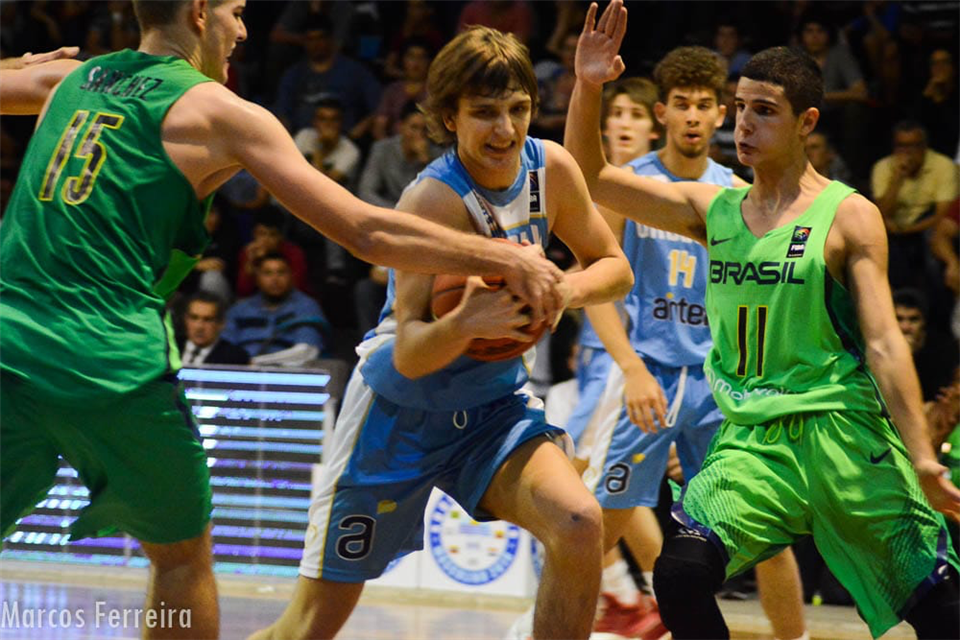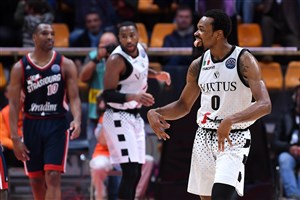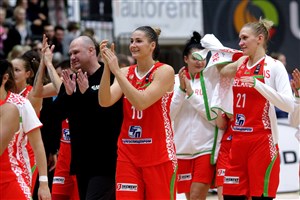
Brazil win U15 South American title, join Uruguay in returning to U16 Americas, Venezuela rue missed chance
REGENSBURG (David Hein's Eye on the Future) - Three teams have booked their tickets to the FIBA U16 Americas Championship 2019 and have an eye on the FIBA U17 Basketball World Cup 2020. While it was business as usual for Argentina, Brazil and Uruguay both will make a return to the U16 Americas tournament while Venezuela are ruing a missed chance with a strong generation.
Argentina, Brazil and Uruguay all advanced from the South American U15 Championship 2018, which was won by Brazil in the Final over hosts Uruguay while Argentina claimed third place by knocking off Venezuela.
Brazil will be making their fourth appearance at the U16 Americas after taking home the South American crown with a 65-57 victory over Uruguay. Felipe Motta nailed 6 three-pointers en route to 36 points to lead Brazil, who also got 12 points and 7 rebounds from Rodolfo Bolis. The Brazilians survived committing 23 turnovers and hitting just 11-of-20 free throws partially by out-rebounding Uruguay 41-31.
 Uruguay beat Brazil 66-63 in the Group Phase but the hosts could not overcome Brazil again in the South American U15 Championship 2018 Final.
Uruguay beat Brazil 66-63 in the Group Phase but the hosts could not overcome Brazil again in the South American U15 Championship 2018 Final.
“This group became a team with a very specific goal: qualify for the FIBA U16 Americas Championship 2019. We knew this championship was very important for the future of our generation and the others to come,” said Motta, who was dealing with an injury issue the first three games in which he scored 29 points total before hitting for 28 points and 11 rebounds in the Semi-Finals against Argentina and then the huge Final to win the tournament MVP honor.
This Brazil team is the same one that beat hosts Venezuela in the South American U14 Championship 2017 last year. And both U14 and U15 Brazilian teams were coached by Thelma Tavernari, who has won over 100 titles in her illustrious coaching career and is a legend at the Brazilian powerhouse club Pinheiros. The question next summer will be if the Brazilians can finally qualify for their first ever FIBA U17 Basketball World Cup, having placed fifth in all three previous FIBA U16 Americas tournaments.
Uruguay meanwhile are back at the FIBA U16 Americas Championship for the second time following 2013, when they hosted the event. The Uruguay federation stepped up and hosted the U15 South American tournament and the efforts were rewarded.
“Above all this gives me a good feeling by seeing that our kids have evolved. They have understood the concept of what we started working at when this development cycle began around 2016. The federation has made a great effort by hosting the tournament and they have shown us confidence that we’re doing a good job. I’m flattered and feel honored about carrying the responsibility of leading this talented group,” said Uruguay head coach Marcelo Capalbo.
The Uruguay federation started the CEFUBB training center which gives the country's staff the chance to bring in kids from all over the country to help develop them. And the Uruguayans, who missed their first 17 three-pointers in the Final against Brazil, definitely have a couple of intriguing talents on the U15 team. Augustin Ubal was the second leading scorer of the tournament at 15.2 points to go with 3.4 rebounds, 2.6 assists, 1.6 steals and 1.2 blocks. And Joaquin Rodriguez averaged 13.0 points, 5.5 rebounds, 2.5 steals and 2.3 assists.
Capalbo said the Uruguay federation is thinking about more than just the FIBA U16 Americas Championship with this 2003 generation, which is probably the most talented since the 1991-1992 group which featured current national team stars Bruno Fitipaldo and Mathias Calfani.
 Will the likes of Augustin Ubal and Joaquin Rodriguez play with Mathias Calfani in the senior national team in the near future? Uruguay basketball leaders hope so.
Will the likes of Augustin Ubal and Joaquin Rodriguez play with Mathias Calfani in the senior national team in the near future? Uruguay basketball leaders hope so.
“Beyond trying to compare this group to the generation of Calfani and Fitipaldo, the challenge is to try to have them playing together,” Capaldo said. “If we make calculations for when Calfani and Filtipaldo will gear up for their last Olympic cycle then these kids are going to be arriving in the senior squad. We have to aim for that goal.”
Argentina meanwhile have never missed a U16 Americas tournament or a U17 World Cup. And head coach Juan Gatti is accordingly pleased about the team grabbing third place in South America to keep alive the chance of making it six for six at the U17 global stage.
“Super satisfied with the tournament. We have the chance of continuing with this process, having a new international competition next year,” said Gatti, whose team beat Venezuela 64-58 in the Third Place Game.
Argentina were paced Agusto Roveres, who averaged a double-double (10.2 points and 12.4 rebounds); Juan Gorsosito and Esteban Caffaro, the latter being the younger brother of Francisco Caffaro.
Venezuela for their part are majorly disappointed about missing out on the FIBA U16 Americas Championship - after having played in the last two continental tournaments. The Venezuelans felt they had one of the best generations in some time, including Keiver Marcano, Jean Aranguren and Reiner Obray but especially the bottom level 2004-born group, which included Osmar Garcia and Italy-based Fabrizio Pugliatti. Despite being a year younger, Garcia was the tournament leader in efficiency (21.8) and rebounds (12.6 rpg); third in assists (3.4 apg), and fourth in scoring (14.2 ppg) and blocks (2.0 bpg).
“Osmar Garcia came to this tournament to show that he’s one of the most dominant players in the region. If we talk about 2004-born players, definitely Osmar would be the top ranked player of the continent, and we have to take into account that he’s a 14 year old playing against 2003-born kids, being superior to them,” Venezuelan head coach Manuel Echezuria said.
The coach said nobody in the tournament was double-teamed except Garcia, who even saw triple teams over stretches.
“That gives you an understanding of how dominant Garcia is with and without the ball in his hands. His leadership and composure was on full display.”
But Venezuela could not come up with the necessary performance in the Semi-Finals - though Garcia had 9 points, 11 rebounds, 4 assists and 2 steals. The teams scored only 7, 8 and 9 points in first three quarters, respectively, and then failed to get the important win over Argentina in the Third Place Game.
Now the Venezuelan 2003-born generation is left without a FIBA tournament, though some could get pushed and play at next year’s South American U17 Championship for 2002-born players.
The next three teams for the FIBA U16 Americas Championship 2019 will be decided shortly before the new year with the CentroBasket U15 Championship 2018 in Mexico. Joining hosts Mexico in the tournament from December 11-16 in Hermosillo will be Costa Rica, Dominican Republic, Haiti, Panama and Puerto Rico. The top three finishers will join Brazil, Uruguay and Argentina in the FIBA U16 Americas Championship 2019.
David Hein
FIBA
FIBA's columnists write on a wide range of topics relating to basketball that are of interest to them. The opinions they express are their own and in no way reflect those of FIBA.
FIBA takes no responsibility and gives no guarantees, warranties or representations, implied or otherwise, for the content or accuracy of the content and opinion expressed in the above article.





















